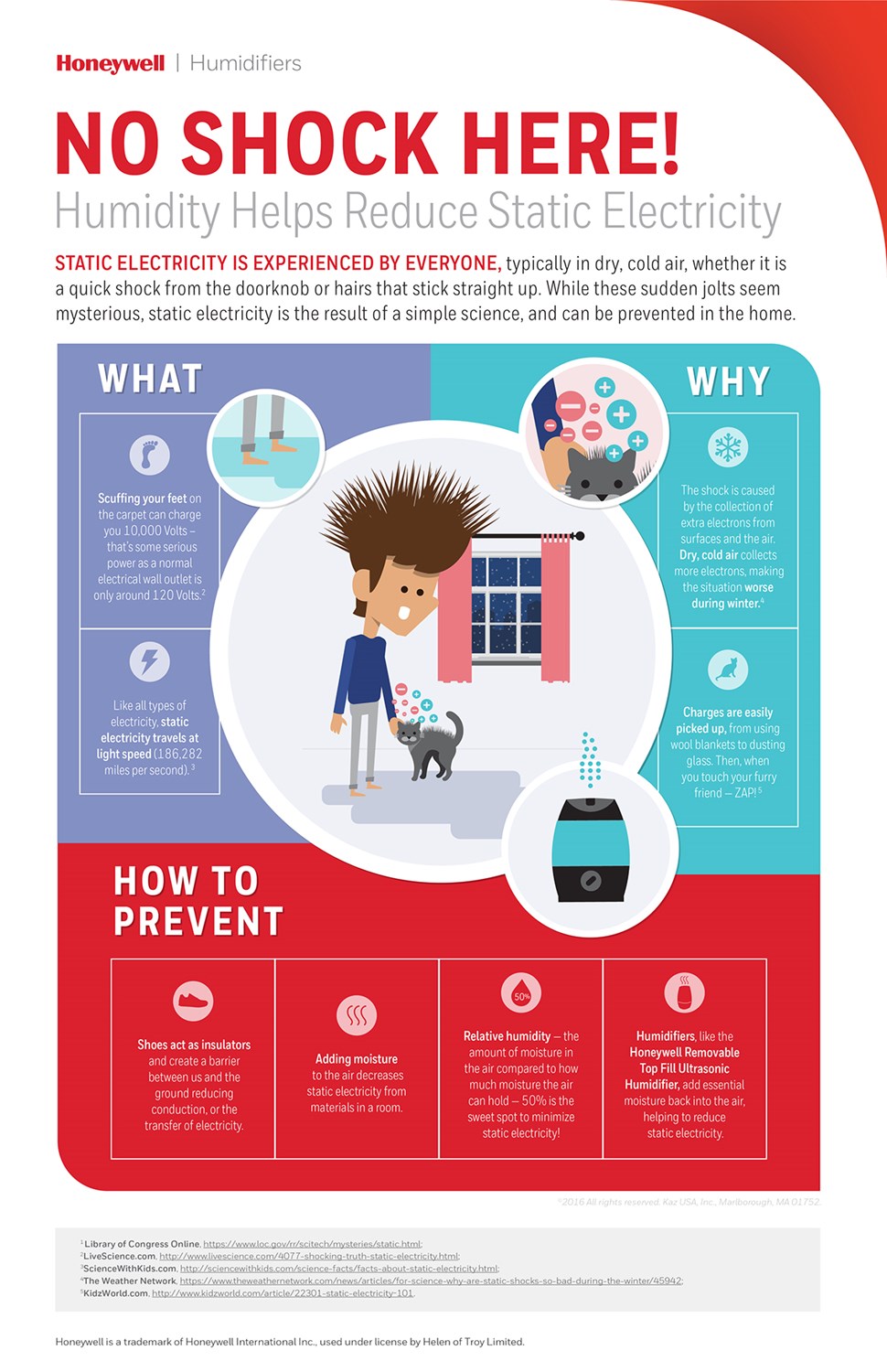Jan 29, 2019

Now that we’re deep into winter, you may have noticed that your hair is a little more frizzy than usual, or that your clothes tend to cling together more easily. These common wintertime inconveniences are caused by static electricity. You probably first learned about static electricity from the balloon experiment in grade school — you rub a balloon against your head, and when you pull the balloon away, your hair sticks up, clinging to the balloon.
Dealing with static electricity in your home, however, is a lot less fun than the balloon experiment made it seem. Not only is your hair a mess each time you run a brush through it, but you’ve probably suffered a few unpleasant shocks, as well. And the strangest part is that static electricity seems to only cause trouble in the winter.
Why does static electricity affect us more in the winter? Let’s find out.
What is Static Electricity?
Static electricity is created when an imbalance of electrical charges exists within an object. As electrons are either lost or gained, objects can take on a positive or negative electric charge. When a positively-charged object comes into contact with a negatively-charged object, the sudden exchange of energy creates that static shock we’ve all experienced. If the charge is intense enough, you may even see a visible spark.
The various materials you encounter in your environment can have a big impact on the amount of static electricity you experience. For example, carpeted floors collect electrons from your feet more easily than wood floors, which can cause your body to build up a more intense positive charge and, therefore, suffer from static electricity shocks more often. You’ll also notice that different fabrics carry different electrical charges. Polyester carries a stronger electrical charge than cotton, which is what leads to frizzy hair and static cling.
Here’s Why Static Electricity is Worse in the Winter
A positively- or negatively-charged object will continue to hold its charge until it comes into contact with an object with the inverse charge. When electrons are unable to transfer freely, these charges build up, intensifying the effects of static electricity.
Conductors keep electrons moving, which reduces the likelihood that objects will build up charges, whereas insulators prevent electrons from passing through, allowing objects to become charged enough to create static electricity.
One of the most common conductors we encounter is water. Since water allows electrons to travel freely, it’s less likely for static charges to build up in an environment where water is present. This is why static electricity is rarely an issue in the summertime — humid summer air holds more water than dry winter air.
The key here is humidity, not necessarily temperature. While it is true that warm air naturally holds more water than cold air, water vapor is often removed by our furnaces in the process of heating the air in our homes during the winter. This dry air creates an ideal environment for static charges to build up, leading to those dreaded static electricity shocks each time you flip the light switch.
How to Avoid Static Electricity Shocks
Static shocks can be very unpleasant. Luckily, there are a few things you can do to reduce the effects of static electricity in your home:
Pay attention to the materials you wear. Synthetic fabrics, like polyester and nylon, and rubber-soled shoes increase the static charge in your body. Avoid static electricity shocks by switching to leather-soled shoes and cotton clothing when possible.
Protect yourself from static-prone furniture. Similar to clothing, furniture fabrics can cause your body to build up a strong static charge. Cotton blankets, special furniture covers, and anti-static sprays can all help reduce your risk of static shock.
Install humidifiers. We mentioned earlier that water is a great conductor, which is why static electricity is worse in the winter — dry winter air lacks humidity, which increases your risk of static shock. Humidifiers pump water vapor into your home, which allows electrons to move freely and prevents you from building up strong static charges. Keeping the relative humidity in your home above 30% will make a huge difference.
Check out this Honeywell infographic for more information about humidification and static electricity:

Call CroppMetcalfe for Help with Home Humidification
If you’re tired of dealing with painful static electricity shocks each winter, it’s time for you to install a humidifier in your home. Whether you opt for portable humidifiers or a permanent, whole-home humidification system, you won’t have to worry about those nasty static shocks each time you touch a doorknob or flip a light switch.
Questions about home humidification? Call CroppMetcalfe’s 5-Star Technicians at 703-698-8855 or contact us online to schedule a service appointment.